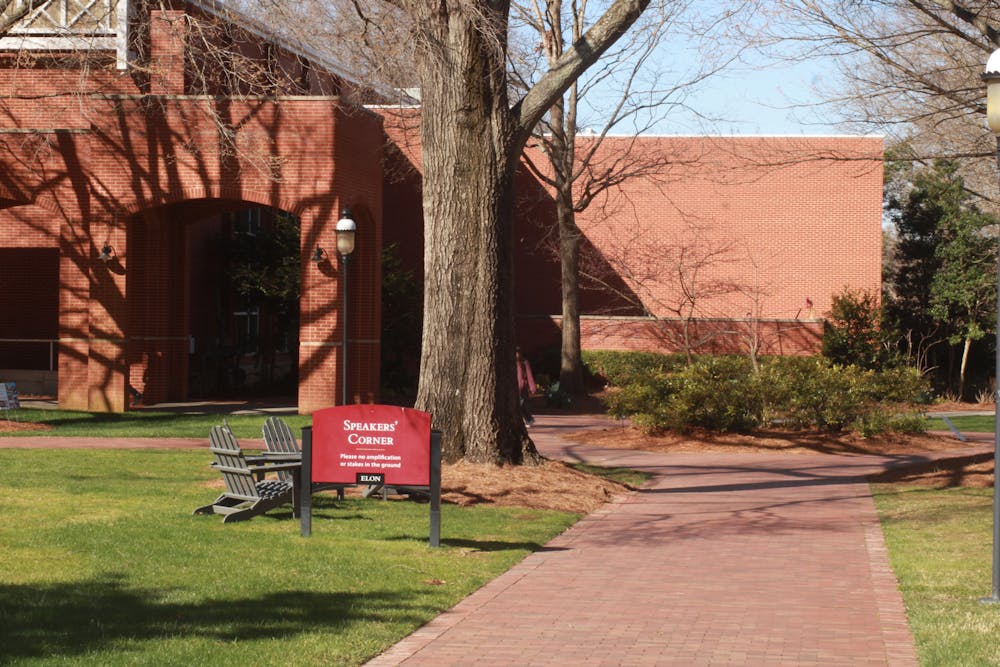On a small corner of green in Young Commons lies the Speakers’ Corner. All public demonstrations are supposed to be concentrated here. Events can be planned and registered to the university. It rarely happens. The corner is virtually always empty. The campus is too.
In 2024, we face an election and global upheaval. Many schools are crowded with activism and speech about the conflicts in the Middle East and Europe.
At Brown University, students staged a hunger strike for pro-palestinian causes, And other schools across the country have been staging sit-ins. There has been the occasional protest, but they are not part of the daily rhythm of the university. The most I have personally seen at Elon was a Valentine’s Day card in the library that read, “Will you free my Palestine?”
Elon’s administration has fostered debate, but you don’t see overwhelming input from the students. Sometimes the calm atmosphere of the school feels nice, but political sleepwalking stifles debate and the electricity of the idea. This problem is present in many small, private schools, and most of them like keeping it that way.
Elon is definitely not a school hinged on promoting censorship and lukewarm activism. We have above-average levels of private advocacy. In the 2020 election, Elon students had a voting rate of 74%, 8% above the national average. The fire of public activism is still missing.
There are lots of size and social factors that come together to put Elon’s free speech in a confusing place. This Speakers’ Corner is not the center of this issue, but each time I walk by it serves as a symbol to me–we need to use our speech more.
The small size and private status
Since Elon is a private school, it does not have a constitutional obligation to free speech. If speech is considered disruptive enough, it can result in expulsion. According to Elon’s guidelines for civic engagement, speech must not “interfere with the normal operations of the University.”
On top of the peer scrutiny from the small size, the university has more room to designate protests as disorderly conduct or “failure to comply with the directive of a university official.”
Upholding free speech at Elon lies in two issues. One is self-censorship, and the other is about using free speech to keep it.
Graham Piro, a program officer for the campus rights and advocacy team for the Foundation for Individual Rights and Expression, said there were two separate issues in the elements of self-censorship. One is reprisal from the school and the other is the chilling of those around you.
Piro said that in publicly owned universities, the government plays a primary role in the upkeep of first amendment rights, but a private university “should be publicly held accountable.”
“I think that self-censorship is a decision not to fully express yourself, your beliefs, or your stance on something," Piro said.
The framework of Elon’s speech is hindered by it being a small, private school because the consequences of free speech are amplified in a small school. The social capital of the censoring group holds much more power.
Elon Student Body President Britt Mobley said he thought that Elon wasn’t apolitical or censoring students. He said that the University promoted conversation and spaces. However Mobley said those spaces came with the challenge of getting students involved in them.
“The university does allow for spaces and allow for organizations that talk about important issues in our society,” Mobley said.
Mobley said the worst case scenario coming from self-censorship is “an echo chamber.” This was especially true, Mobley said, when students don't reach across the aisle with dialogue.
“The university is not doing anything to censor folks, but this self-censorship is what causes folks to have this kind of conundrum,” Mobley said.
Too similar of backgrounds
Elon has a demographic that largely pulls from a specific economic bracket. The student population is very white and wealthy. The median household income being $208,300. The school population of students specifically is 82% white. There is an argument to be made that coming from a position of cultural power makes activism less lucrative, especially in public.
Additionally, senior Curran Gilster, the vice president of the Elon College Republicans, said many Elon students hailed from concentrated states where there weren’t many members from the opposite party to speak with. As a result, there was less of a “passion for debate.”
The president of the Elon College Democrats, Brian Nixon, similarly said that because of its high tuition cost, Elon faced the gridlock of similar demographics as well.
“I think that brings in a demographic that is wealthier and, for sociological reasons, has less of an incentive to get involved in politics,” Nixon said.
Our spaces aren't symbols, they are tools
Since free speech is not constitutionally protected in private schools, the school feels a need to reassure us by putting in symbols of free speech. One example of this could be the Speakers’ Corner, or the dozens of panels held on weeknights populated by gray heads.
During this coming election, we need to make ourselves as seen as possible. This is going to be a historic year for democracy and the human voice. Over half of the world’s population will be at the polls according to the Conversation. A silent vote is one thing, a voice is another.
Piro said the best way for students to express their rights was to study them in the student handbook and then exercise them accordingly.
“Standing up for what you believe in will send a message that the campus is a place where there is a really robust free speech culture,” he said.
Rights become symbols instead of tools if they aren’t used. What is true for the Speakers’ Corner is also true for the democracy we hold in our hands. Our rights are up to us now. Let's see how we will use them.


